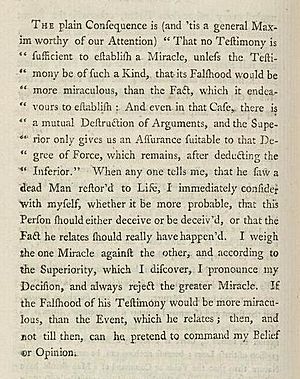Of Miracles facts for kids
"Of Miracles" is a famous part of a book written by David Hume in 1748. The book is called An Enquiry Concerning Human Understanding. In this section, Hume talks about whether we can truly believe in miracles.
Contents
What Hume Says About Miracles
Hume defines a miracle as something that goes against the usual laws of nature. He believes these laws are based on what we've seen happen over and over again. Hume argues that it's never wise to believe a miracle report. He thinks it's much more likely that someone is either mistaken, misunderstood something, or is trying to trick us, rather than a law of nature actually being broken.
Where the Idea Came From
Hume first wrote about his ideas on miracles in his 1748 book, Enquiry. Interestingly, he didn't include these thoughts in his earlier book from 1739. Also, some publishers in the past would leave out the sections on miracles from the Enquiry because they were seen as controversial.
For example, in one 19th-century edition, the miracle sections were put in an appendix. It said they were usually left out of popular versions. Even though modern books include them, this part of Hume's work has also been published on its own.
Hume once wrote a letter to his friend Henry Home, Lord Kames in 1737. He explained that he decided not to publish his arguments against miracles in his first book. He didn't want to upset readers who had strong religious beliefs.
Hume's Main Argument
Hume starts by saying he found an argument that could stop "superstitious delusion" for smart people.
How We Judge Evidence
Hume first explains how we should judge different claims. He says we decide what to believe by looking at the evidence. The more evidence there is for one claim over another, the more we should believe it. Things like how trustworthy the witnesses are, how they tell the story, and how many witnesses there are, all affect how much weight the evidence has.
What a Miracle Is
A miracle is defined by Hume as when a law of nature is broken by a god or some invisible power. But, he says, laws of nature are based on "firm and unchangeable experience." This means countless people, in many places and times, have seen these laws always work. This is how Hume separates a true miracle from something that is just amazing or unusual.
Why Miracles Are Hard to Believe
The evidence for a miracle is always limited. Miracles are single events that happen at a specific time and place. Because of this, the evidence for a miracle will always be less than the evidence against it. The evidence against it is the proof that the law of nature usually works without fail.
Why Witnesses Might Be Unreliable
Hume then talks about why we should be careful about believing miracle stories. He says that no miracle has ever had enough witnesses who were honest, smart, and educated enough. He lists reasons why people might not be completely reliable when reporting miracles:
- People often love to hear and believe strange and amazing stories. These stories make them feel surprised and full of wonder.
- People with strong religious beliefs might even make up stories they know aren't true. They might do this "with the best intentions" to help their religion.
- Others are often too quick to believe these witnesses. The witnesses might seem honest and speak well, and the amazing story itself can make people stop thinking critically.
- Miracle stories often come from "ignorant and barbarous nations." This means they come from places or times when people didn't know as much about the world. History shows that cultures start with many stories of supernatural events. But as people learn more, these stories become less common.
Miracles and Different Religions
Hume also points out that many different religions have their own miracle stories. If we believe the miracles of one religion, why not believe the miracles of all of them? But since different religions often disagree with each other, they can't all be true at the same time.
Criticism of Hume's Ideas
Many thinkers have disagreed with Hume's argument.
Some, like R. F. Holland, say that Hume's definition of a "miracle" is too narrow. They argue that an event doesn't have to break a natural law to be a miracle.
Other critics, like George Campbell and C. S. Lewis, have said that Hume's argument goes in a circle. They argue that Hume assumes laws of nature cannot be broken to prove that miracles don't happen. But whether laws of nature can be broken is the very question they are trying to answer.
Philosopher John Earman also criticized Hume. He said Hume didn't understand probability well. However, many Hume scholars disagreed with Earman, saying he misunderstood Hume's ideas.
 | DeHart Hubbard |
 | Wilma Rudolph |
 | Jesse Owens |
 | Jackie Joyner-Kersee |
 | Major Taylor |


